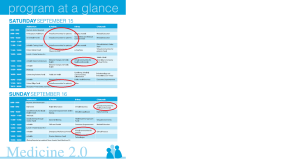The room was packed. I had been fretting about giving this talk since my abstract was accepted back in March. How I was going to deliver something meaningful in 10 minutes? But, much to my surprise, the standing-room-only crowd was calming.
It would appear that people at Medicine 2.0 wanted to know about community management and how to build and sustain thriving online communities. The importance of this topic was revealed by the sheer number of presentations and posters about online community at the congress.
The room was packed. I had been fretting about giving this talk since my abstract was accepted back in March. How I was going to deliver something meaningful in 10 minutes? But, much to my surprise, the standing-room-only crowd was calming.
It would appear that people at Medicine 2.0 wanted to know about community management and how to build and sustain thriving online communities. The importance of this topic was revealed by the sheer number of presentations and posters about online community at the congress.
Knowing that I had quoted Susannah Fox in my opening slide fortified me:
“PewInternet Project data shows that if you can enable an environment in which people can share, they will and the benefits will entice others to join.”
Surprise number 2: Susannah Fox was in the room in real life, as were so many others, like Gonzalo Bacigalupe, who until then I had only known as avatars. The smiling faces encouraged me. I put my notes aside and talked about the importance of the enabler – the community manager.
Surprise number 3: I won the 2012 JMIR Award, which is given for the best presentation of unpublished research presented at Medicine 2.0. Thank you, Gunter Eysenbach and the JMIR editorial board for awarding me this honour. I look forward to fleshing out evidence-informed community management practices for publication.
Surprise number 4: Presenters like Osman Hassan Ahmed, Jackie Bender, Pam Ressler and Alex Djuricich made impromptu reference to my talk during their presentations.Hallway conversations with Raphaelle Laubie, Ari-Matti Auvinen, Paul Wicks, Catherine Heilferty, Mike Massissmi, Rob Fraser, and so many more, further underlined the interest and necessity of effective community management. The conversation even continued in the air post-conference when I found myself seated next to Trevor D Van Mierlo, Founder of Evolution Health, developers of customizable community platforms.
A community is defined by its members and the relationships they build, regardless of platform. It was encouraging to see many research initiatives that had built close-knit groups of people who share a profound sense of community.
But, do you have an adoption plan? What happens to your community when the research project is no longer able to maintain the management of the community or the platform is no longer supported? When starting a community, I encourage you to develop a plan for sustainability, mitosis and adoption. The health and well-being of real people may depend on it.






